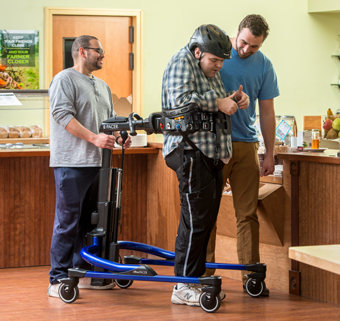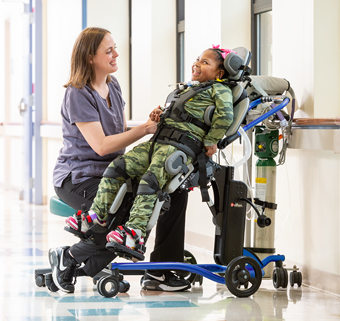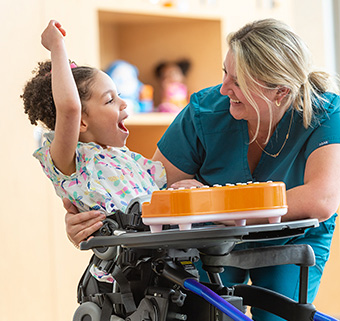The “How” of Ecological Assessment
Part 3 of The Ecological Assessment: The Why, the What, the How
| December 2021 According to Dr. Bronfenbrenner, ecological assessment involves stakeholders to identify student performance challenges and assist in their analysis. As a first step, thorough interviews of parents, classroom staff, paraprofessionals, physical education teachers and anyone involved in the student’s educational sphere can provide qualitative information on the student’s performance. As therapists, we often approach a student with a diagnosis mindset as opposed to a classroom performance mindset. Interviews can re-direct our thinking to a more participatory mindset, provide a launch point for our clinical observation and begin to create our hypothesis regarding performance.
According to Dr. Bronfenbrenner, ecological assessment involves stakeholders to identify student performance challenges and assist in their analysis. As a first step, thorough interviews of parents, classroom staff, paraprofessionals, physical education teachers and anyone involved in the student’s educational sphere can provide qualitative information on the student’s performance. As therapists, we often approach a student with a diagnosis mindset as opposed to a classroom performance mindset. Interviews can re-direct our thinking to a more participatory mindset, provide a launch point for our clinical observation and begin to create our hypothesis regarding performance.
The next step is observation in contexts of concern. We observe what the student is expected to do and what peers are doing. We observe the dynamic of the classroom staff within those contexts and with the student. These observations can determine the influence of the learning environment on performance and on the social interactions of the student within that environment. “In the educational setting, participation includes the student’s attendance, active involvement, engagement, and sense of belonging in school activities or routines.”1
Using an ecological assessment allows the team to make comprehensive decisions regarding accommodations, modifications and/or appropriate adaptive equipment that may facilitate student participation. “Ecological assessment is a useful strategy to determine the demands of the environment and any skill discrepancies for students; such skill discrepancies could be addressed with specific Supplementary Aids and Services (SaS).”2 SaS are key elements to students remaining in their Least Restrictive Learning Environment (LRE) as Individuals with Disabilities Education Act (IDEA) 2004 mandates.
The Ecological Assessment results might point to other tools aligned with student performance. The use of another tool can augment our overall assessment of the student and support data collection and outcome measurement. The assessment could also point us in the direction of creating participation-based goals with our teams. “As school-based therapy services are intended to help students participate in and benefit from their educational program, (IDEA, 2004) student goals that address participation in the context of school activities and routines (henceforth referred to as participation-based student goals) are closely aligned with this intent.”3
As you proceed with the school year 2021-2022, using an ecological approach to assess your students will help you fulfill your responsibilities as a related service provider: “developmental, corrective, and other supportive services as are required to assist a child with a disability to benefit from special education” ( IDEA 2004, Section 300.34). Developmental activities and routines should be aligned with developmentally appropriate expectations for the age and grade of the student. Corrective and other support services should be provided using the expertise of the related service provider, in order to mitigate barriers to access to special education for a student with disabilities. This fulfills the overarching mandate of IDEA to make students’ college and career-ready, using educationally relevant “real-life” activities and experiences within the learning environment to build Individualized Education Plan (IEP) content and student success.
See Part 1: The “Why” of Ecological Assessment and Part 2: The “What” of Ecological Assessment.
References
- Kimberly D. Wynarczuk, Lisa A. Chiarello, Edward Gracely, Susan K. Effgen, Robert J. Palisano & Kathleen Fisher (2021) Participation-Based Student Goals in School-Based Physical Therapy Practice: Influence on Service Delivery and Outcomes, Physical & Occupational Therapy In Pediatrics, 41:5, 485-502.502, DOI: 10.1080/01942638.2021.1877234.
- Kurth, J., McQueston, J., Ruppar, A., & McCabe, K. (2018). Types of Supplementary Aids and Services for Students with Significant Support Needs. Journal of Special Education. 52(4).
- Wynarczuk, K., Chiarello, L., Fisher, K., Effgen, S., Palisano, R. & Gracely, E. (2019) development of student goals in school-based practice: physical therapists’ experiences and perceptions. Disability and rehabilitation. DOI: 10.1080/09638288.2019.1602673. https://doi.org/10.1080/09638288.2019.1602673.







